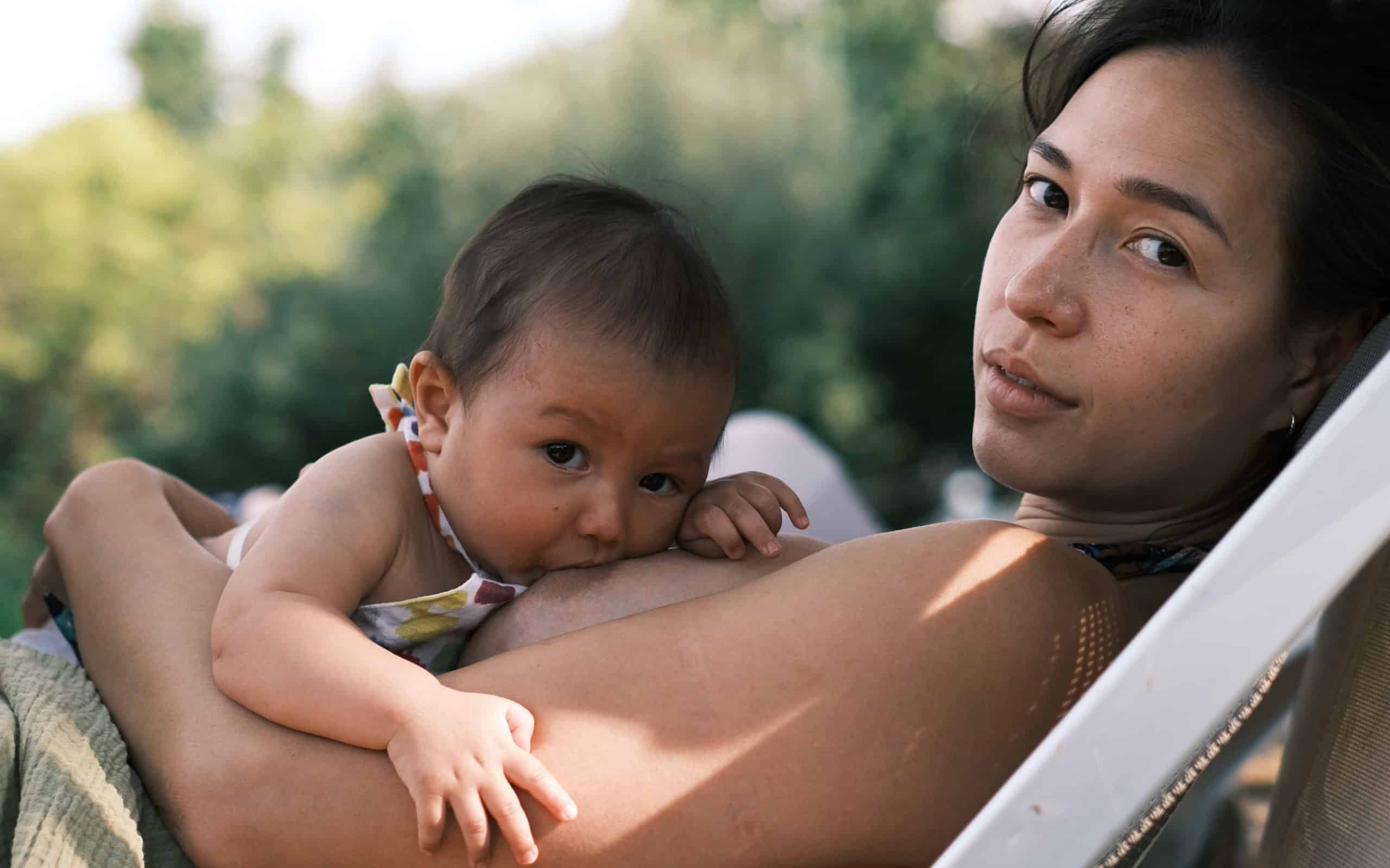



That’s me and my daughter, Lyla, at 5 months old. At this point, I have breastfed for 19 months and have just weaned! There is so much to that simple sentence that I am emotional yet grateful for the time and experience. Let me say that breastfeeding is not for everyone. While The American Academy of Pediatrics (AAP) encourages breastfeeding for at least a year I believe women should have autonomy over their bodies, and how they choose to feed their babies and live their lives. With each mother comes individual choices and capabilities, so whatever you choose is good for you and your family. You should be happy with your decision without judgment. I have learned a lot from sharing my personal experience with other mothers and from my Lactation Counselor Training with Childbirth International. Ultimately what I have learned from this journey is not only that it is intensely unique, personal, and intricate but that this precious act of self-sacrifice is profound and ultimately rewarding.
We got off to a rocky start. Breastfeeding difficulties and complexities came as such a shock to me I wanted to shout it from the rooftops! Wanting to arm myself and other women with the knowledge that I had not been privy to prepartum I wrote the article: What to Expect as a New Mom Breastfeeding Baby. As I opened up about the changes I made I found comfort that I wasn’t the only one in the world that found it difficult. Two months in my baby Lyla gave up the bottle and the pacifier. She just didn’t want them anymore. As I had ample supply I let the boob fulfill all her needs and at 4 months I finally regulated. We can only go up from here, or so I thought. Little did I know that the hurdles of exclusively breastfeeding had just begun and we had only cleared getting going.
One of the most common fears when breastfeeding is the eruption of teeth. Ouch! For the mother, that means they could possibly bite down on us or that they can now eat food and no longer need our nutrition. While we could rationalize this way it is far from the truth. Breastfeeding beyond 6 months not only provides myriad developmental benefits for our little one but health benefits for us, the Mom, as well. We should not be so short-sighted to cut off this first food source for our little ones. Even weaning at 19 months I still worry about her nutritional intake, immunity, and digestion. Typically, around 6 months, a baby’s front 2 incisors emerge. As the baby’s tongue covers these teeth we often don’t feel a thing. A baby will want to latch more when teething because their jaw is sore and nursing soothes them. Breastmilk also acts as an antibiotic while holding them close helps them through these teething times.
Here is a full list of tips and tricks on teething from La Leche League.
Something I didn’t expect when breastfeeding is that when my baby got sick I would too. It completely makes sense considering how much time we spend in close contact, but I didn’t expect to be taken down so easily. Breastfeeding doesn’t eliminate the possibility of illness, rather it lessens the instances of ear infections, comforts, gives antibodies, nourishes, and hydrates them when they are ill. As she didn’t take a bottle or pacifier beyond a few months old I became her everything. We became extremely attached. Looking back on our sick days together, we were so intertwined that it was easier for us to recover together than it would be apart. I wouldn’t give up those commiserating cuddles for anything.
As we create human life maternal nutrition matters greatly. Nutrition was not something I paid great attention to until I became anemic during my pregnancy and had 4 root canals postpartum. Specifically for lactation, an extra 500 kilocalories of food per day is needed to meet the energy demands, but of course, not just any calories will do. Pregnancy depletes maternal iron stores and, as mothers’ milk is made from nutritional stores in our own blood and bones, it’s important that we eat right for our own replenishment and our baby’s nourishment. Take a look at this blog if you want to know how I am working on replenishing my body!
For more information on intergenerational maternal health please take this 2-hour FREE master class.
Someone teach me to snack! I eat with my whole heart, but I am not one to snack in between meals. Once when Lyla was 16 months old I fainted in the streets from not eating in time. In Paris, it’s typical to eat dinner late, so when 9 pm rolled around and we hadn’t managed to eat, my lactating body just couldn’t cope. As breastfeeding Moms, we not only need to eat more, and healthfully but drink more water too. I have so many 2L water bottles that I have to carry around with me all the time so as not to get depleted. One way my husband Henry helped is to cook for us! Bless him, he really stepped up to feed this ravenous mom and make sure I always had that giant bottle refilled with fresh water.
As soon as your doctor clears you to exercise you may want to jump back into your old routine right away, but as a fitness instructor, I would always ask my students to see a pelvic floor specialist. Our bodies have shifted tremendously, so we do want to get that extra layer of clearance before starting any routine. Even after months had passed I found feeding 8-10 times a day and being in a calorie deficit all the time is not in line with the additional load of exercising. As the baby gets older and starts on solids the demand on our body lessens and we are able to find a bit more time for ourselves. A lot of women worry about bouncing back or returning to their pre-baby size. As our health is paramount what is more important to focus on when breastfeeding is to eat for nutritional demands and replenishment. It is true that breastfeeding or pumping creates uterine contractions and burns more calories, but more important than making our body “contract” is to adjust to life as a mother because we are forever postpartum.
Feeding on demand and without anyone else to feed her was extremely taxing. With this came the attachment, as in nonstop clinginess. Months where I could barely put her down and no one else could hold her. The most common reasons cited for stopping breastfeeding in the first 6 weeks were inconvenience or fatigue associated with breastfeeding (22.6%) and concerns about milk supply (21.6%). Having been through it I can attest that the constant (it seems) latching especially while our own bodies are trying to heal and replenish postpartum is a lot. With my husband often abroad for work I attachment parented until Lyla was about 5-6 months old, then she slept in her bed (a story for another time). Until then I brought her everywhere with me. Think in the bathroom, kitchen, dentist chair, and chiropractor table. Looking back I know it was tough, but that’s just what mothers do. They selflessly tough it through.
Return to work or school was associated with the length of time that infants were breastfed: 20% of women who stopped after six weeks cited this as the reason. After the first 40 days I did go back to work both online, instructing, as well as managing FitSphere. I am extremely lucky to be able to carve my own hours and really focus on my work after she’s in bed. I have heard some mothers that work better in the early morning before the kids are awake, but I found that as I work with multiple time zones meetings and computer work is most easily done in the evenings. As the primary caregiver and full-time kitchen to Lyla, my work really has to justify my time away. I would still have to pump through the night and in the oddest of places if I couldn’t fit what I needed to do in a precious 2-3 hour window or bring her with me! Those days when baby Lyla would resist milk until I get home or only take an ounce to tie her over really could stress mommy out.
Personally, I found breastfeeding and traveling the hardest because of attachment, sickness, and nutrition. While breastfeeding on the plane helps to neutralize the eardrums during take-off and landing, my babe refused a bottle or pacifier, so was nonstop latched on me for up to 20 hours or more at a time while on the flight. Turning to me for food, comfort, and sleep when jetlagged takes a huge toll on the Mother and it’s usually at these times that I feel touched out and want to wean. The bright side is that we really get to travel everywhere together. London, Paris, Italy, Singapore, Bali, and NYC are just some of the flights we have taken together. There are companies that help to ship your breastmilk like BoobyFood.
Beyond the multitude of benefits for mom and baby to breastfeeding it wasn’t until we fully weaned off that I really noticed the gifts that breastfeeding gave us. The hormones, once regulated, really feel exceptional in the body and I loved being able to coregulate our emotions. Whenever Lyla latched it was like I got a download from her, of how she was feeling, and ultimately felt great purpose in pausing to provide her with the sustenance she needed. Now having weaned I don’t know if I will breastfeed again, so am truly grateful for the time together and the connection it provided us.
Breastfeeding until 19 months was an incredible time in our lives. One of extreme closeness and emotional regulation, with so much love and precious time together. Having a few friends with babies the same age that was also breastfeeding as well was super key! Every tooth, flight, or flu had frantic texts and links sent in support. Choosing to breastfeed is not without its ups and downs, so with everything we overcame it truly felt like it was us against the world. We fought as mothers, as a team, and as a family, for the privilege to exclusively breastfeed for 19 months and that will forever be a happy memory in our hearts and lives.
*This article is written personally by Liv. If you find it insightful, please copy the link & share it with friends. Sharing is caring 💞
Get Liv’s Healthy Lifestyle Updates to your Inbox